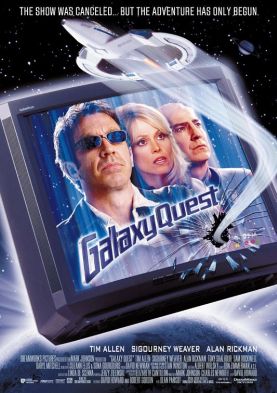Galaxy Quest
Galaxy Quest, directed by Dean Parisot and written by Robert Gordon and David Howard is a hilariously funny spoof of the “Star Trek” mania chronicled in Roger Nygard’s recent documentary, Trekkies. Nygard’s film is as sad as it is funny, since it shows us real people who choose to live in a fantasy world. But in Galaxy Quest, the Hollywood dream factory (Dream Works, to be precise) comes to the rescue, making the fantasy become reality—so to speak. Tim Allen stars as the William Shatner lookalike Jason Nesmith, a washed up actor still famous for his role as Commander Peter Quincy Taggart on the long-canceled TV show “Galaxy Quest,” who now makes a living, along with his most prominent fellow crew members, speaking and signing autographs at conventions of the Trekkie-like fans of the show.
At one of these conventions there turns up a group of fresh-faced fans led by someone calling himself “Mathasar” (Enrico Colantoni) who claim to be Thermians from the Klatu nebula (a nod there to The Day the Earth Stood Still). They are under attack from a cruel warlord called Serus and are desperately in need of help from the famous Commander Taggart. Accustomed to falling into such role-playing games without further discussion, Nesmith finds himself whisked off into outer space on board a space ship designed by real aliens to be an exact replica of the one on the TV show, which they imagine to be a factual record. “Everything you see around you has been garnered from the historical documents,” says Mathasar.
“Oh my God! It’s real!” says Nesmith.
The latter returns to earth for his crew, which includes Lt Tawny Madison (Sigourney Weaver), whose job it is to repeat everything the talking computer says and expose a glimpse of breast-top from time to time, the Spock-like Dr Lazarus (Alan Rickman) with a reptilian prosthesis on his head who keeps moaning about having once been a real actor who played Richard III and Sergeant Chen (Tony Shalhoub) whose fictional technical wizardry is belied by his being more or less permanently spaced out. “We’re just here to negotiate this guy Serus’s surrender. It’s no big deal,” an excited Nesmith reassures the others. “Alexander, it’s the role of a lifetime.”
Which is exactly what it turns out to be. The dawning realization of these tired old has-beens that the roles they have been playing with increasing resentment for years are suddenly being treated as realities, not only by the adoring Thermians but by the stunningly efficient killer, the lobster-headed Serus, produces not only a lot of laughs but also an entirely believable re-invigoration of their sense of self-esteem. For the laughs are always better when they are based on a foundation of truth, and the truth behind this movie is that heroism, like virtue itself, is an act. It does not come naturally to any of us to put aside the fears and desires of the natural man in order to behave bravely and nobly. Heroes become heroes by acting the part of heroes. Thrust into a situation where their heroic roles on the series must be played out in real life, the crew respond with reluctant but heart-warming fidelity to their fictional selves.
What keeps them up to it is the equally touching devotion to those selves of the heroically gullible Thermians who, like Swift’s Houyhnhnms, do not understand the idea of lying. When things go predictably wrong, they say to the seemingly hopeless incompetents, “We have seen you victorious in much more desperate situations; it must be our fault.” But even this capacity for belief has its counterpart among a group of teenage fans who also know every detail of the ship’s made-up technology and so are able to guide their formerly jaded heroes to their inevitable triumph over the bad guys. There are as many laughs in this film as there are in Being John Malkovich, and you also may feel a little catch in the throat when you see the catch-line of the cheesy TV series, “Never give up; never surrender,” becoming a reality.
Discover more from James Bowman
Subscribe to get the latest posts to your email.







